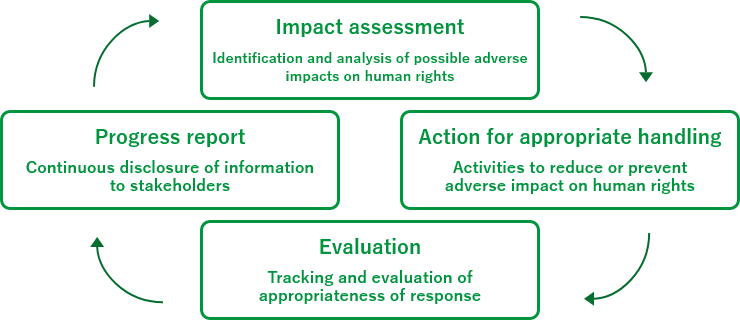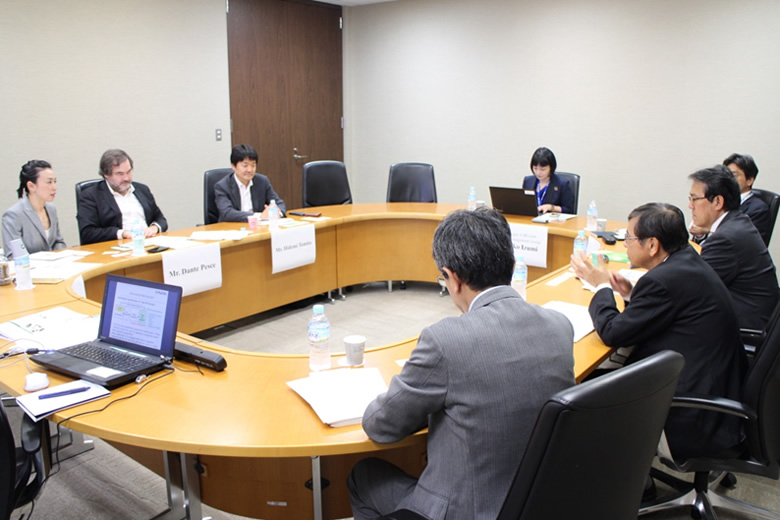Human Rights Management
Management information
Relation between themes and business activities
The Fuji Oil Group's business activities involve the participation of several stakeholders. We recognize that our business activities can have direct or indirect impacts on the human rights of a wide range of stakeholders, from employees through laborers in the supply chains to consumers.
Basic approach
As stated in our Group Management Philosophy, the Fuji Oil Group upholds a commitment to "Work for people" as one of its core values. In line with this commitment, we, as a globally operating company, will engage in business activities that respect human rights throughout the value chain. Our participation in the 2016 United Nations Forum on Business and Human Rights and the dialogue with our stakeholders gave us the opportunity to reformulate our way of thinking about human rights. As a result, we announced the Fuji Oil Group Human Rights Policy in April 2017.
Fuji Oil Group Human Rights Policy PDF (400KB)
Promotion system
Under the supervision of the Chief “ESG” Officer (C“ESG”O), who is the officer in charge of CSR at Fuji Oil Holdings, the ESG Management Group promotes Group-wide efforts to respect human rights and raise awareness of human rights issues, to identify and control human rights risks, and to ensure that human rights are respected at all workplaces and business sites.
In addition, respect for human rights in the value chain has been incorporated in the ESG management priority themes,* and the ESG Committee,*2 which is an advisory body to the Board of Directors, prepares progress reports and examines issues for submission to the Board of Directors.
* Refer to the URL below for details of ESG management priority themes.
https://www.fujioilholdings.com/en/csr/materiality/
*2 Refer to the URL below for details of the ESG Committee.
https://www.fujioilholdings.com/en/csr/approach/
Educational, promotional and awareness-raising activities
The Fuji Oil Group promotes educational and awareness-raising activities on business and human rights.
In FY 2019 we designated December 4 to 13, 2019 as Fuji Oil Group Human Rights Week. During this week we share our basic approaches embodied by the Human Rights Policy with all Group companies and heighten employees’ awareness of our initiatives to promote the theme “business and human rights”. The programs listed below were implemented under the co-sponsorship of the Chief Administrative Officer (CAO) and the C“ESG”O. Some employees’ comments on the programs were: “The programs have made me aware of the relationship between the Group’s commitment to "Work for people" shown in the Group Management Philosophy and human rights,” and “The programs have enabled me to understand the company’s intention to value human rights.”
![]()
| Human Rights Week programs | Targets |
|---|---|
| Management messages (messages from the CEO, CAO and C“ESG”O) |
All Fuji Oil Group companies |
| Business and Human Rights e-learning movie | |
| Commentary article on business and human rights | |
| Daily e-newsletters on business and human rights | Fuji Oil Holdings Inc. and Fuji Oil Co., Ltd. |
| Diversity seminar |
Business and Human Rights e-learning movie
Human rights due diligence
Overview of human rights due diligence
The Fuji Oil Group conducts human rights due diligence as part of our responsibility to respect human rights.

Process of impact assessment
Process of identifying human rights risks
In FY 2016, the Fuji Oil Group conducted a human rights impact assessment to identify and evaluate the possible adverse impacts of its business activities on human rights and to identify priority key issues. During the assessment, we gained insight not only from related internal departments but also from Verisk Maplecroft and Caux Round Table Japan as external experts.
In the first stage, based on Verisk Maplecroft's expertise, we quantitatively assessed the human rights risks in which the Group's business activities and operational areas could be involved. In the second stage, based on the results of the first stage, we conducted interviews with related in-house parties to reflect the actual situation of the Group in addressing human rights risks. The second stage was done in collaboration with Caux Round Table Japan.
Our business environment has changed since the impact assessment in FY 2016, due to M&A and other factors. For this reason, we plan to conduct a second impact assessment in FY 2020.
Human rights risks identified and progress of countermeasures
![]()
| Human rights risks identified | Specific concerns | Countermeasures | Progress | |
|---|---|---|---|---|
| 1. Education and training of Group employees |
|
(1) Insufficient mechanism for the Human Rights Policy to be reflected in employee behavior | Providing education and training |
|
| (2) Insufficient monitoring of human rights risks at joint venture companies and recently acquired group companies | Managing human rights risks using each company’s risk management system |
|
||
| (3) Insufficient Human Rights Risk monitoring at temporary and contract laborers | ||||
| 2. Grievance mechanism |
|
Lack of grievance mechanisms for the supply chains despite the existence of the internal hotline system | Establishing grievance mechanisms for the supply chains |
|
| 3. Raw materials supply chains |
|
High human rights risks particularly in the palm oil and cacao supply chains | Promoting sustainable procurement |
|
Establishment of a grievance mechanism
Internal hotline system for employees
We established a whistleblowing hotline system* for employees of Group companies inside and outside Japan and employees of some cooperating companies.
* Refer to the URL below for details of the internal hotline system.
https://www.fujioilholdings.com/en/csr/governance/compliance/
Grievance mechanism for our supply chains
In May 2018, we established and announced a grievance mechanism* based on our Responsible Palm Oil Sourcing Policy. We set up a Grievance Mechanism web page in English on the Fuji Oil Group website to announce the mechanism and its progress.
* Refer to the URL below for details of the grievance mechanism.
https://www.fujioilholdings.com/en/csr/grievance_mechanism/
Dialogue-based review of initiatives
Expert panel dialogue
In June 2019, we held a dialogue with experts on business and human rights to receive their advice on our current and future initiatives for business and human rights. This was the fourth dialogue that we have held on this theme since FY 2016. Mr. Dante Pesce, a member of the United Nations Working Group on Business and Human Rights, and Mr. Hidemi Tomita, Director of Lloyd's Register Japan, participated as experts in the dialogue. Participants from the Fuji Oil Group included the CEO, the C“ESG”O, the executive officer in charge of the Oils & Fats and Chocolate Division, and members of CSR departments.
In the dialogue, the participants exchanged their views on comprehensive approaches toward business and human rights and the palm oil grievance mechanism, which the Group had launched as a specific human rights initiative in May 2018. Through the process of exchanging views with the experts, we confirmed the importance of dialogue with stakeholders and received advice on approaches toward the operation of the grievance mechanism. One of the most relevant inputs was that, based on the United Nations Guiding Principles on Business and Human Rights, it would be desirable that parent company-level grievances* are addressed appropriately even if they occur outside our supply chains. We used the input received during the dialogue to improve our activities. To address parent company-level grievances in particular, in FY 2019, we began offering related information to our direct suppliers and monitor the parent companies under suspicion of breaching human rights. Furthermore, the updated Grievance Procedure,*2 which was disclosed in April 2020, announces that the Fuji Oil Group will address parent company-level grievances as grievances in line with the definition by RSPO.*3 We will continue implementing our initiatives for business and human rights while receiving advice and validation of our approaches from experts.
* Parent company-level grievances: Grievances that are filed against businesses that are operated outside our supply chains by the parent companies of suppliers in our supply chains, and do not comply with our policy
*2 Refer to the URL below for details of the updated Grievance Procedure.
https://www.fujioilholdings.com/en/csr/grievance_mechanism/
*3 RSPO: Roundtable on Sustainable Palm Oil
